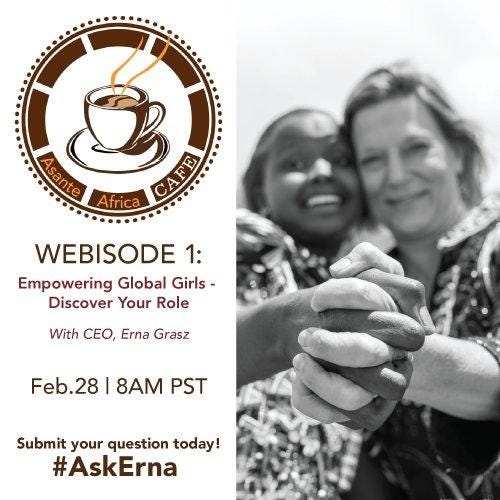
We are thankful to our Twitter and Facebook community for taking their time to engage with our CEO, Erna Grasz on February 28, 2018 in a live chat. In the spirit of celebrating women all March long, #AskErna was a great way to stimulate transformative dialogues on women empowerment issues especially on access to quality education in the rural areas.
It was a fun and insightful conversation that encompassed the role of boys and men in empowering their female counterparts, challenges faced by women in the corporate world, challenges that women face transitioning into adulthood, how success looks like for a rural girl, bridging the rural-urban gap, and role of programs to ensure a sustainable life.
We are excited to learn that the community is rich with ideas that could contribute towards addressing these issues.

Here are some excerpts from the conversation:
- How can we address the challenges faced by young girls transitioning into adulthood?

2. Could you comment on the impact on boys when they are included in the conversation regarding empowering girls?

3. @RuthMuthamia Asks: The modern day woman has to work ten times more than the male on equivalent jobs. She has to offer something undignified in return like herself for that opportunity. What can we do to shun that? Though we are empowering the girl child to embrace education but in return worse things await for them in this business world. Please help find ways to solve such challenging issues.


4. As one of change agents in Kenya, empowered through Asante Africa Foundation’s Girls’ Advancement Program, there has been great concerns about boy child not included in the programs. What’s the future for upcoming husbands/ fathers?


5. Does educating girls solve the problem? How do you change the way people think, traditions that have been used for generations?
Educating young girls is just one step to improving Girls Education. We need to foster communication between parents, elders and their daughters so that they are also aware of the challenges, and can become involved in finding solutions. In most parts of Africa the elders are most respected and are held to a higher standard, by keeping communication open it will help them to understand the struggles and challenges they face and spread awareness throughout the community.

6. How can we ensure that young girls in marginalized regions get equal opportunities as those in more advantaged regions?
The needs of rural & urban communities are different. In order to reach the “last mile” communities, the initiatives must be owned by those communities, be low cost, be intuitively designed, and be culturally relevant to the community so locals can champion it.
7. Do you think African women who have “already made it”, are doing enough towards contributing to girl child empowerment?


8. How are people aware that they are empowered? What does success look like for a rural girl?
To be empowered means to be enabled, confident, strong, and self-sufficient. For a rural girl the challenges and struggles they face are amplified. However, a successful rural girl has access to and seeks opportunities to advance her skills, and helps other women understand their rights and improve their skills to perform in life and in their jobs more efficiently and effectively.
9. How can we extend programs to untapped rural areas where there’s still quite a number of girls who do not have access to opportunities?
By getting the parents and communities involved, so they realize the importance of education, we can start to create a ripple effect. According to World Food Program, “policies and programs must address gender disparities in leadership and entrepreneurship, as well as the specific needs of millions of rural women working in the informal economy, by promoting their access to formal markets and value chains, innovative technologies and practices.”
Stay tuned on social media for our next Asante Africa Cafe Webisode. Until then, let’s keep the conversation going. Use#AskErna on Twitter (@AsanteAfrica) and Facebook (@AsanteAfrica), or click here!
